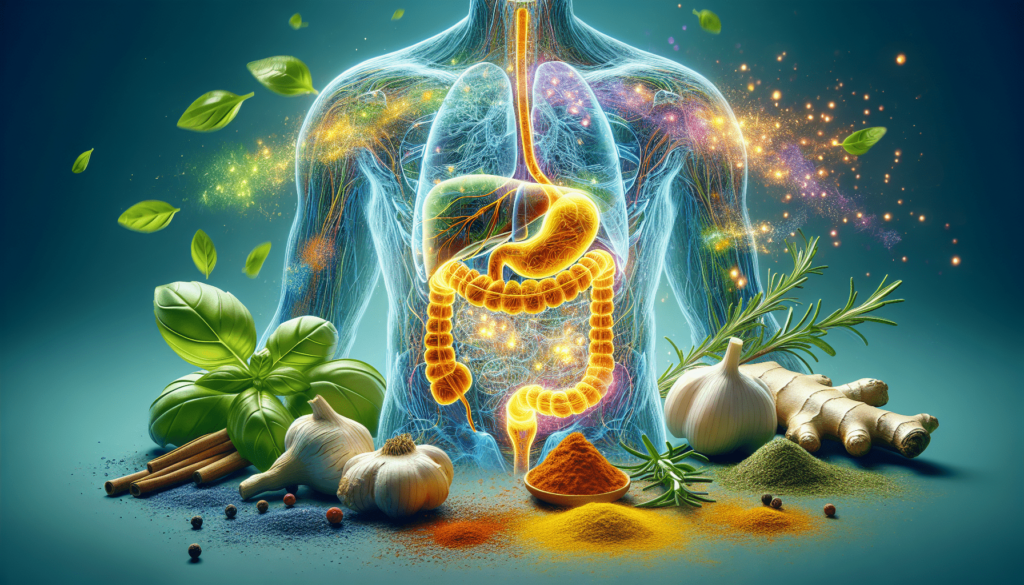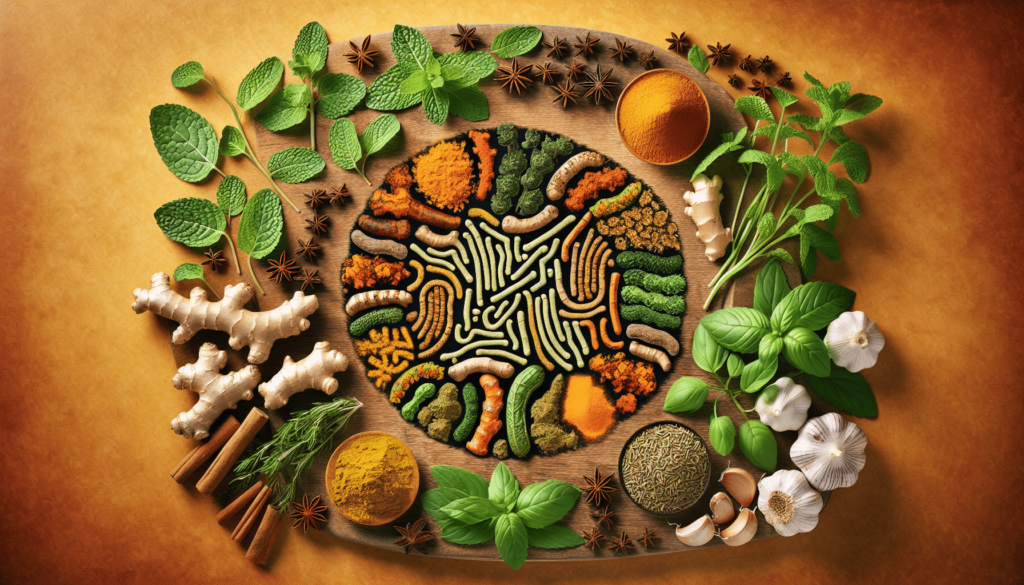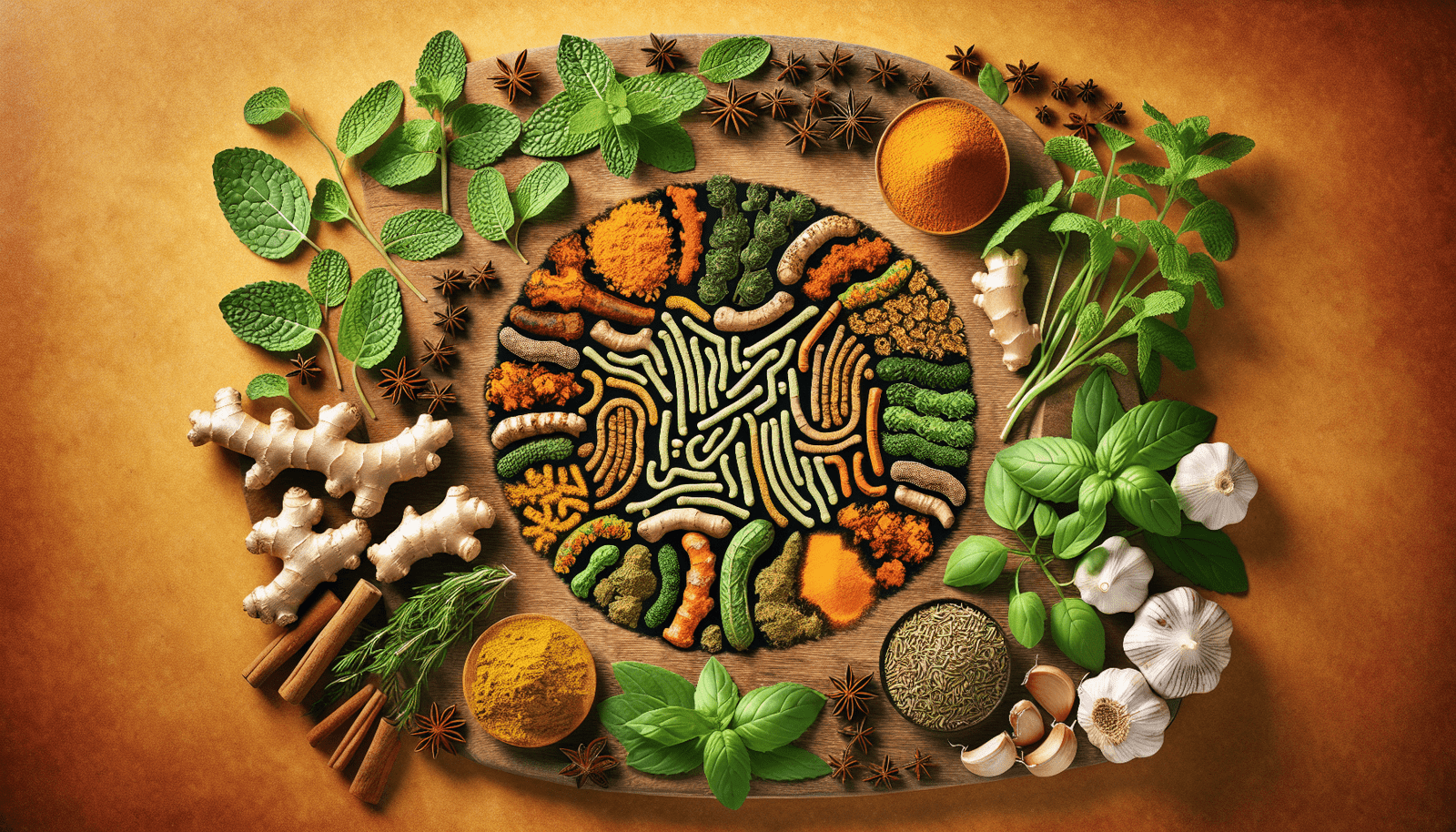Herbs and spices offer more than just flavor to your meals; they can also work wonders for your gut health. With their natural compounds and anti-inflammatory properties, these culinary powerhouses can help soothe digestive issues, promote healthy gut bacteria, and aid in overall digestion. Whether it’s the calming effects of chamomile, the antibacterial properties of garlic, or the digestive benefits of ginger, incorporating herbs and spices into your diet can be a delicious and effective way to support your gut health. So, why not spice things up and give your gut a boost?
1. Introduction
Definition of gut health
Gut health refers to the optimal functioning and balance of the gastrointestinal tract, which includes the stomach, small intestine, and large intestine. It encompasses the well-being of the gut microbiota, which are the trillions of bacteria residing in the digestive system. A healthy gut plays a crucial role in overall health, as it is responsible for nutrient absorption, digestion, immune function, and even mental well-being.
Importance of gut health
Maintaining good gut health is essential for various reasons. Firstly, a healthy gut ensures efficient digestion and absorption of nutrients from the food we consume. This is vital for overall energy levels and the proper functioning of all bodily systems. Additionally, a balanced gut microbiota promotes a strong immune system, as the majority of our immune cells reside in the gut. Furthermore, research has shown a link between gut health and mental health, suggesting that an imbalanced gut can contribute to mood disorders such as anxiety and depression. In light of these factors, it is important to prioritize and nurture gut health to support overall well-being.
2. Overview of Herbs and Spices
Definition and examples of herbs
Herbs are plants whose leaves, stems, or flowers are used for flavoring, medicinal purposes, or fragrance. They are typically obtained from aromatic plants and are used in cooking, herbal medicines, and even aromatherapy. Some well-known examples of herbs include basil, rosemary, cilantro, mint, and thyme. These flavorful additions to culinary creations not only enhance taste but also offer an array of health benefits.
Definition and examples of spices
Spices, on the other hand, are derived from various parts of plants such as the roots, bark, or seeds and are known for their strong flavors and aromas. Unlike herbs, spices are generally dried and ground before use. Popular spices include cinnamon, turmeric, ginger, cumin, and paprika. Their vibrant colors and distinct tastes add depth to dishes, while their medicinal properties have been recognized for centuries.

3. Composition of Herbs and Spices
Nutrients in herbs
While herbs are often used sparingly in culinary applications, they contain a surprising amount of essential nutrients. Many herbs are rich in vitamins and minerals, such as vitamin C, vitamin K, calcium, iron, and potassium. For example, parsley is abundant in vitamin K, which is important for blood clotting and bone health, while basil provides a good source of vitamin K, manganese, and antioxidants.
Nutrients in spices
Spices, too, boast an impressive nutrient profile. These flavor powerhouses are known for their high antioxidant content, which helps combat cellular damage caused by harmful free radicals. Turmeric, for instance, contains curcumin, a potent antioxidant and anti-inflammatory compound. Cinnamon is another spice that is rich in antioxidants, as well as manganese, iron, and calcium. Incorporating spices into your diet is an excellent way to not only enhance flavor but also increase your intake of beneficial nutrients.
4. Effects on Gut Microbiota
Influence on gut bacteria diversity
Herbs and spices have been found to have a positive impact on gut health by promoting the diversity of gut bacteria. Research has shown that a diverse gut microbiota is associated with better overall health and a reduced risk of chronic diseases. Certain herbs and spices, such as oregano, thyme, and rosemary, exhibit antimicrobial properties that help maintain a healthy balance of gut bacteria.
Promotion of beneficial bacteria
In addition to supporting bacterial diversity, herbs and spices have also been found to promote the growth of beneficial bacteria in the gut. Some compounds present in herbs and spices act as prebiotics, which serve as food for the beneficial bacteria. For example, garlic contains inulin, a prebiotic fiber that stimulates the growth of beneficial bacteria such as Bifidobacteria and Lactobacilli. By nourishing these beneficial bacteria, herbs and spices contribute to a healthier gut environment.

5. Anti-inflammatory Properties
Reduction of gut inflammation
Inflammation in the gut can lead to various digestive disorders and discomfort. Fortunately, many herbs and spices possess anti-inflammatory properties that can help alleviate gut inflammation. Turmeric, for instance, contains curcumin, which has been extensively studied for its powerful anti-inflammatory effects. Ginger, another well-known spice, also exhibits anti-inflammatory properties and has been used for centuries to relieve digestive issues such as nausea and bloating.
Protection against digestive disorders
The anti-inflammatory properties of herbs and spices not only reduce gut inflammation but can also offer protection against digestive disorders. For example, studies have shown that ginger can help alleviate symptoms of irritable bowel syndrome (IBS), including abdominal pain, bloating, and diarrhea. Similarly, herbs such as peppermint and chamomile have been used traditionally to soothe and calm the digestive system, providing relief from conditions like indigestion and gastroesophageal reflux disease (GERD).
6. Improved Digestion
Enhancement of digestive enzymes
One of the ways in which herbs and spices contribute to improved gut health is by enhancing the production and activity of digestive enzymes. These enzymes play a vital role in breaking down food components, aiding digestion, and maximizing nutrient absorption. For instance, herbs like fennel and dill contain compounds that stimulate the production of digestive enzymes, facilitating the breakdown of complex carbohydrates and proteins.
Reduction of indigestion symptoms
Indigestion can be uncomfortable and disrupt daily life. Fortunately, many herbs and spices have been used traditionally to alleviate symptoms of indigestion. Peppermint, for example, has long been cherished for its ability to ease stomach discomfort, including bloating and gas. Additionally, coriander has been found to possess carminative properties, which help relieve flatulence and aid digestion. By incorporating these digestive-supporting herbs and spices into your meals, you can improve your digestion and prevent discomfort.
7. Increased Nutrient Absorption
Enhancement of nutrient uptake
A healthy gut is essential for optimal nutrient absorption. Interestingly, some herbs and spices have been found to enhance the bioavailability of certain nutrients. For instance, black pepper contains piperine, a compound that has been shown to increase the absorption of curcumin from turmeric. By pairing these two spices together, you can enhance the absorption of curcumin’s potent antioxidants and anti-inflammatory properties.
Support for nutrient assimilation
In addition to improving nutrient uptake, herbs and spices can also support the assimilation of nutrients within the body. For example, cumin, commonly used in Indian cuisine, has been found to enhance the digestion and absorption of essential minerals like iron and calcium. This can be particularly beneficial for individuals who may have difficulty absorbing nutrients efficiently, such as those with certain digestive disorders.
8. Protection Against Gut Infections
Antimicrobial properties of herbs and spices
Herbs and spices have long been used for their antimicrobial properties, which can help protect against harmful bacteria and infections in the gut. Garlic, for example, contains a compound called allicin, which has potent antimicrobial effects and has been shown to inhibit the growth of various bacteria and parasites. Similarly, oregano, thyme, and cinnamon possess antimicrobial properties that can help combat pathogens in the gut.
Prevention of harmful bacteria growth
Furthermore, herbs and spices can help prevent the growth of harmful bacteria in the gut, thus maintaining a healthy balance of the gut microbiota. Research has shown that certain compounds present in herbs and spices, such as thymol and carvacrol found in thyme and oregano, have strong antibacterial effects. By incorporating these natural antimicrobial agents into your diet, you can help protect your gut from infection and promote overall gut health.
9. Prudence in Usage
Moderation for individuals with sensitive digestive systems
While herbs and spices offer numerous health benefits, it is important to exercise moderation, especially for individuals with sensitive digestive systems. Some spices, such as chili peppers, can be irritating to the gastrointestinal tract and may worsen symptoms in those with conditions like acid reflux or gastritis. It is recommended that individuals with these conditions consult with a healthcare professional to determine which herbs and spices are appropriate for them.
Possible side effects and interactions
It is worth noting that, although generally safe, some herbs and spices can have potential side effects and interactions with certain medications. For instance, the coumarin present in cassia cinnamon can thin the blood and interact with anticoagulant medications. Similarly, some herbs may interact with medications, such as St. John’s wort interfering with antidepressant drugs. To ensure safe consumption, it is advisable to consult with a healthcare professional or a qualified herbalist before incorporating herbs and spices into your routine, especially if you are on medication.
10. Conclusion
Summary of the benefits of herbs and spices for gut health
In summary, herbs and spices offer numerous benefits for gut health. They promote bacterial diversity, enhance the growth of beneficial bacteria, reduce gut inflammation, aid digestion, improve nutrient absorption, protect against gut infections, and contribute to overall well-being. Incorporating a variety of herbs and spices into your diet not only adds flavor to your meals but also maximizes the potential health benefits they offer, supporting a healthy gut.
Importance of incorporating them into the diet
Given the extensive benefits to gut health, it is crucial to incorporate a wide range of herbs and spices into your daily diet. By doing so, you can harness the numerous nutrients, bioactive compounds, and therapeutic properties that herbs and spices possess. Whether you choose to elevate your dishes with aromatic herbs or add a touch of spice to your meals, embracing the flavorful world of herbs and spices can contribute to a healthier gut and a happier you. So, don’t be afraid to experiment with different herbs and spices in your cooking and discover the incredible impact they can have on your gut health.

